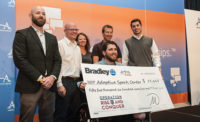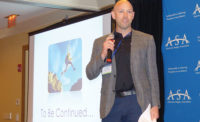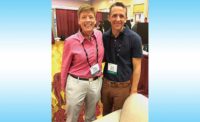Vision is an interesting word. As a noun, it means you can physically see the world of possibilities around you. When used as a verb, it means you can imagine them.
Operation Rise & Conquer was founded in 2013 by former Gerber/Danze CEO Michael Werner, a man with a vision who saw what such a program could mean for our nation’s severely wounded veterans — and how it could unite our industry to support it together.
This fall at ASA’s NETWORK2016 in New York City, attendees heard from Private First Class Steven Baskis, who lost his sight in an explosion while serving in Iraq, but gained vision through determination, attitude and participating in programs like ORC.
Baskis was one of more than 70 veterans (and their families) served through ORC and the Adaptive Sports Center in Crested Butte, Colo., last year. Baskis possesses such poise and positivity. Instead of dwelling on what he no longer has, he prefers to focus on all the possibilities ahead.
Growing up, Baskis’ family moved around the country (due to his father’s career as an inventor/scientist in the chemical industry). He was living in the New York area when 9/11 occurred. “I was 15 and that changed everything,” he says. “My father and grandfather’s military service always had been in the back of my mind and that made it very clear to me that I wanted to serve, too.”
He joined the military in 2007 with the goal of becoming a medical sergeant. “I wanted to be an asset and learn as much as I could to help not only myself but those around me,”Baskis says.
Baskis eventually landed with the 4th Infantry Division, Delta Company Special Troops Battalion. They deployed to Iraq in late 2007.
“My squad worked with a general and we provided security wherever he went on the battlefield,” he recalls. “Our call sign was Ghost 1. We always were the lead unit in the battle line. All of Baghdad was susceptible to IEDs. Convoys and mounted patrol teams would go out on missions to make sure the roads were safe, but you could never be sure because the enemy would just come back out and hide more explosives.”
On May 13, 2008, Baskis’ team was on its way back to the forward base near the airport at the northern edge of Baghdad. Their vehicle detonated an EFP (explosively formed projectile).
“It killed Victor Cota, my staff sergeant, and I was seriously injured,” he describes. “My team saved my life. They pulled me from the vehicle and set up a security perimeter. Then they rushed me to an area where a Black Hawk could land.
“I was pumped full of morphine by the medic working with me on the ground. He had to put a trach in and hold my hands down because I kept trying to rub my face and eyes. I was losing a lot of blood and they were trying to keep me awake until the Black Hawk got to us.”
The following 72 hours were a blur, as Baskis was rushed through field hospitals to Ramstein in Germany and then to Walter Reed in Washington, D.C.
“It was a surreal experience and I have just dream-like memories of it — people yelling, the sounds of helicopter or jet engines transporting me, phone calls from family,” he recounts. “My parents got the dreaded call that it was questionable whether I would live. I was so lucky that I was primarily hit by very small pieces rather than large shrapnel. But a large piece of shrapnel hit my helmet and ripped it off my head. I had to have 18 staples to close my head wound.”
Many surgeries were required to stabilize Baskis’ injuries. The shrapnel tore an artery in his arm and caused major wounds to his legs, arms and head. When he regained consciousness with his family at his side, there were tubes coming from his neck, throat, nose, arms and knees, pins in his right hand, and bandages over his eyes. His entire left arm had vascular and nerve damage and he had bleeding on his brain.
“My life was forever changed,” he says. “I had patches on my eyes and I laid there thinking about what happened and wondering about my future. You can’t help but think about what you won’t be able to do anymore. I had so many goals and I realized I would not meet them. I didn’t want to come home broken. I knew there were opportunities available, but I had never experienced life disabled.”
Pushing ahead
Since then, Baskis’ life has been a wild ride of ups and downs — but he’s now finding his footing and is very optimistic about the future.
“It took a year for my body to recover,” he says. “I had a lot of infections and ended up back in the hospital several times. I went through a rehab program that teaches you how to live life as a blind person. It was frustrating, but an important part of my recovery because I wanted to restore who I was. It became my new mission in life.
“I dreamed about things I wanted to do, such as climbing and other outdoor activities. I thought it would help me focus and give me a goal. Mountaineering became my passion probably because it relates so well to the military — the overall mission is to stand on top of a mountain. It’s a colossal task to move a team from base camp to the top of mountain. You share blood, sweat and tears working together to protect, help, guide and share.”
Having a mission or goal again meant Baskis still could find ways to challenge himself. He has climbed several 14,000-ft. peaks in Colorado, a 17,000-ft. volcano in Mexico, the Himalayas near Mount Everest, Kilamanjaro in Africa, Mount Elberst in Russia, Mount Blanc in the Alps and Machu Pichu in Peru.
“One of my goals is to travel and see the world blind,” he shares. “In many ways, nothing has changed. I have lost much of my sense of smell because of olfactory nerve damage. But I can taste and I really enjoy food. And I can touch and identify things through touch and sound.”
Baskis participated in an ORC session with Adaptive Sports last summer that included a climb on Red Cloud and camping on Grizzly Gulch not far from Gunnison and Crested Butte, Colo.
“What Chris (Reed of Adaptive Sports) did for us by leading that climb was amazing,” he says. “That type of experience keeps me ticking and moving forward.”
In reflecting on ORC and what it has meant to him and other severely wounded veterans, Baskis says it “has the power to give an individual who has lost something the ability to live again and establish a new normal. It allows us to get outside and test ourselves. I was damaged and I had to learn again how to live my life.
“ORC gives us the ability to reconnect with who we are in the great outdoors. The challenge isn’t without struggles, but the journey is worth it. It helped give me my life back and will have a lasting positive effect on me. It’s amazing now to be able to reflect and appreciate where I am at.”
And Baskis is just getting started living this new normal. He’s got a huge bucket list, as he describes it. To meet his goal of touching all continents, he still needs to get to Australia and Antarctica. He still wants to finish his degree and graduate from college. He’d also like to establish a foundation that will work with Adaptive Sports and put down roots.
“That will be my rock and I can launch from there to do great things,” he says. “I hope to continue learning, whether conventional or unconventional. And I want to inspire others who may be struggling.”
For more information or to contribute to Operation Rise and Conquer, check out the ASA’s website at www.asa.net/ORC.
This article was originally titled “Pushing ahead” in the January 2017 print edition of Supply House Times.





